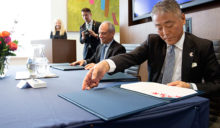Stephen Toope
American companies were increasingly uneasy as they watched share of their home market erode and jobs move to Asia. They railed against unlawful “dumping” and urged government to block imports through quotas and tariffs. “Buy American” became the rallying cry.
Sound familiar? I’m actually not talking about America’s current trade woes with China. I’m thinking back to the 1970s, and growing Japanese dominance in automotive and electronics. Most worrying was that the Japanese were not competing primarily on price – as expected from a lower-wage economy – but on superior quality. How did a country once known for producing inferior goods suddenly become such a threat?
The short answer is wise recognition that the Second World War had fundamentally changed the country’s economic equation and radical transformation was unavoidable. By the late 1980s, Japan dominated the global stock market. Its affluent citizens were a force in the world. Foreign competitors sought to unlock the secret of this successful manufacturing and trading revolution – and were astonished to find one factor was importing made-in-America quality practices not widely followed in America.
A confluence of factors slowed Japan’s economy by the 1990s and Western interest in developments there waned. I’ve noticed a generational gap in Japanese studies. Most of the scholars I know who have made this a primary interest are nearing retirement – with notable exceptions like Dr. Mark Manger of the Munk School, who has written extensively about Japan’s trading history and continues to analyze the country’s contemporary trading practices. I think it’s time we paid much more attention to Japan as an important player in today’s changing global order.
With the spotlight on China these days, it’s easy to forget that Japan is the world’s third-largest economy, with real strength in evolving post-carbon technologies. It has a healthy democracy. But it’s facing significant challenges. It must somehow come to grips with the realities of an aging population, a declining birthrate and a belief in the strength of cultural homogeneity that works against welcoming younger immigrants. President Trump has withdrawn U.S. support for the Trans-Pacific Partnership that was to be a main pillar of Japan’s trading relations. Does it now try to keep the TPP alive without U.S. participation? To negotiate separate deals with the EU and America? To engage more actively in World Trade Organization negotiations?
How will developments in U.S.-China relations affect Japan’s position relative to these global powerhouses? Can it continue to count on America for military protection? Must it contemplate reversing its constitutional commitment to pacifism, joining the Asian arms race and redeploying its considerable Self-Defence Forces (The Economist reports Japan’s navy is larger than those of France and Britain combined and has never fired a shot in battle) from emergency relief to active combat?
While Japan has developed friendly relations with far-flung former enemies, it faces considerable tensions in its own backyard. There are multiple disputes with rival China. There are good practical reasons to align with South Korea – both countries being front-of-the-line in the North Korean firing range. But the weight of historical animosity has so far proven too great, and political uncertainty in South Korea does not bode well for near-term positive change. That is a concern.
At the same time, I can affirm that Japan is serious about furthering knowledge of contemporary Japanese society and its place in the world. The recent creation at the University of Toronto of an endowed chair in Japanese politics and global affairs and a planned Centre for the Study of Global Japan at the Munk School came about with strong support from Japan’s Consul General in Toronto and from the highest levels of the government in Tokyo. We must take full advantage of this incredible opportunity to strengthen mutual understanding on issues pertaining to the global economy, East Asia, and global peace and prosperity.
May 1, 2017
